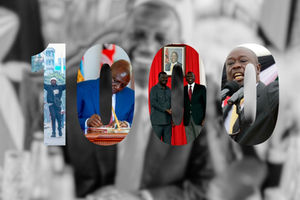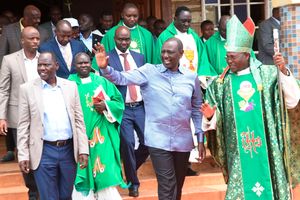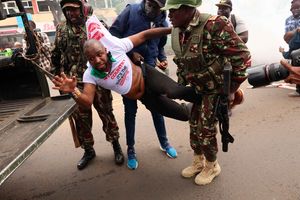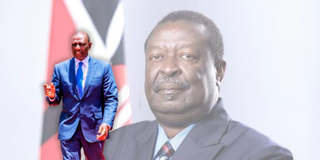
President William Ruto and Prime Cabinet Secretary, and Foreign and Diaspora Affairs Cabinet Secretary Musalia Mudavadi.
When he came to power in September 2022, few people may have known the trajectory of President William Ruto’s foreign policy, except the belief that he could stay the course of certain issues already followed by his predecessors.
The Kenya Kwanza Manifesto didn’t help much and its bit on foreign policy was just a paragraph, promising to pursue economic diplomacy.
Nearly three years down the line, the Kenya Kwanza administration has trialled, erred and moved.
One such thing he tried was offering to mediate in regional conflicts, as predecessors had, but received cold shoulders in Sudan, DR Congo and even in Niger.
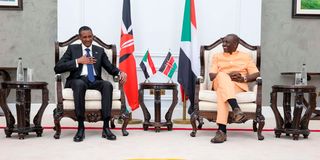
President William Ruto (right) and RSF Leader General Mohamed Hamdan Dagalo at State House, Nairobi.
However, Kenya insists it has a role to play in peace bids in those countries, because it suffers one way or another if the problem persists.
President Ruto had also pursued a campaign for de-dollarisation of the African economies. He argued for localised payments, saying that Africa had no need to depend on the US dollar when they can trade in local currencies.
That bit has since fallen off his speeches, perhaps informed by realities that most of Africa, including Kenya, import stuff to be paid for in US dollars.
Either that or he got a reprimand from the Americans keen to protect their financial hegemony.
To be fair though, President Ruto has sustained his arguments on the financial architecture and the need for reform to enable Africans to get cheaper credit.
That Africa has to borrow based on credit ratings awarded by foreigners is something he has been vocal against.
He has also argued that the World Bank and International Monetary Fund as currently structured do not benefit Africa.
As the African Union Champion for Climate Change, Dr Ruto has been consistent too, speaking on climate issues wherever he goes. In fact, a paragraph on climate change has appeared in every speech he has given since January last year, signalling the importance of environment and climate issues to his administration.
These are central issues to Africa, just as the idea of reforming the UN Security Council, the world’s most powerful body on peace and security.
Dr Ruto’s mantra has been that the Council, as currently structured, is “broken, dysfunctional and no longer fit for purpose.” The Council has 15 members but only five, China, US, UK, France and Russia actually decide substantial issues such as whether to extend sanctions on an African country.
African countries have argued that they cannot be recipients of the Council’s most decisions while having no veto powers.
The five permanent members have often resisted the changes. Yet in calling for reforms at the UN or elsewhere, the President sometimes wanders in a diplomatic hot zone.
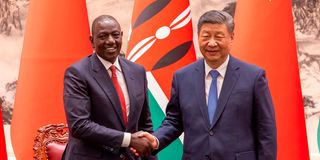
President William Ruto with his Chinese counterpart Xi Jinping at the Great Hall of the People in Beijing, China.
In Beijing in April, he gave a speech criticising US tariffs, American senators responded by demanding clarity on allegiance. Nairobi argued, in turn, that Kenya was not siding with a particular world power but would build relations based on interest.
“We will pursue good relations with all countries—China, the US, Iran, Japan, Uganda, Tanzania, the UK—provided it benefits Kenya,” Prime Cabinet Secretary, and Foreign and Diaspora Affairs Cabinet Secretary Musalia Mudavadi told the Nation last week.
Strong economic ties
“There is an English saying, that a (man’s) home is his castle. So, even if you live in a hut, that is your castle and so, we will continue to pursue good relations with China and all other nations.
“We will continue to pursue good relations with America. We will continue to pursue good relations with Japan, Uganda, with Tanzania, with the UK and every nation. We will continue to pursue good relations with nations that are mutually beneficial to Kenya and those specific nations that we are entering into agreements with.”
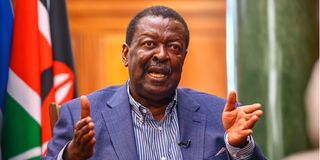
Prime Cabinet Secretary and Cabinet Secretary for Foreign and Diaspora Affairs Musalia Mudavadi.
There is an economic reason not to take sides and Mr Mudavadi argues that Kenya’s biggest trading partners are first in the neighbourhood; Tanzania and Uganda. China and the European Union are just as important and the US role on security support programmes is useful even though the aid that came from Washington for crucial health programmes has since been paused.
“Kenya's development is anchored in strong economic ties and strategic partnerships with our neighbours. The recently published 2025 Economic Survey affirms this reality, demonstrating how much we depend on each other,” Mr Mudavadi argued.
While Dr Ruto has tried to seek stronger economic ties, opened up borders for easier entry for visitors and sustained a Pan-African look, he has departed on some of the traditions.
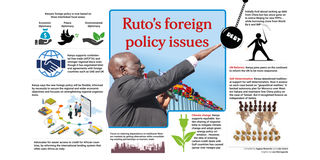
For example, Kenya now backs the autonomy plan for Morocco in Western Sahara. It is a departure from tradition where Nairobi supported the self-determination of the Sahrawi. This change is informed by global realities, according to diplomats familiar with the stance.
It is a realisation that Western Sahara may never actually be independent because a referendum initially planned for that choice has since become untenable. This change likely angers Algeria which had backed Sahrawi’s independence and in fact hosts the Polisario Front government in exile.


